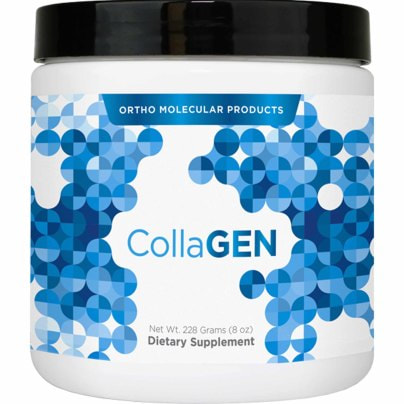What is Collagen? Collagen is found throughout the body in the connective tissues, including skin, bone, tendons, cornea, blood vessels, ligaments and the discs between our vertebrae. There are at least 28 different forms of collagen in our body with the main types being I (dermis, tendons, ligaments, bone), II (cartilage, vitreous body, nucleus, III (skin, vessel wall, reticular fibers) and V (lung, cornea, hair, fetal membranes, bones).
What is the Primary Medical Nutrition Therapy Use? Evidence supports the use of collagen for the following conditions:
Expected Outcome
Aging skin
1-10 gram/day
↑skin moisture, elasticity
Pressure Ulcers
15 grams three times daily
↑stimulation of immune cells
Cellulitis
2.5 grams type I for six months
↓fat cells with ↓lymphatic fluid between cells
Osteoporosis prevention
5 gram per day
↑pre-osteoblastic cells
Osteoarthritis
2-40 grams per day
↑cartilage area, ↑extracellular matrix, ↓inflammatory cells ↓
Joint Pain
1.2-40 grams per day
↓inflammatory cells ↑cartilage area
Tissue Repair
5-15 grams gelatin
↑collagen synthesis
Tendinopathy
2.5 grams twice per day
↓microvascularization
Hypertension
2.9 grams per day
↑serum nitrous oxide ↓decreased plasma renin
Type II diabetes
6.5 grams twice per day
↓fasting glucose, HBA1C, insulin, lipids, increases insulin sensitivity
Rheumatoid Arthritis
.1 – 5 mg per day
↓rheumatoid factor, inflammatory cells
Adapted from: https://fullscript.com/hcp/collagen
Note that the dosages in the rheumatoid group were much lower than for the other groups. This group was typically allowed to stay on their medications while the collagen was being administered so the collagen did not take the place of medication but was used with it.
Are There Adverse Effects Associated with Collagen Use? Collagen is one of the safest supplements on the market. Feelings of fullness or an unpleasant taste may be associated with its use, but these are hardly unsafe.
A note of caution with regards to allergies. Since collagen is made from various protein sources such as eggs, pork, fish, if you are allergic to any of the sources used to manufacture the collagen you should avoid that source and choose another source.
How to Choose a Collagen Supplement
Collagen is made up of several incomplete amino acids which all have individual effects on bioactivity and absorption. There are a few things to consider when shopping for a collagen supplement:
https://us.fullscript.com/welcome/kshattler Just sign in and start shopping using either the catalog function or Nutritional Synergy's favorite function.
References:
Daily Consumption of Collagen Reduces Signs of Aging
Pressure Ulcer Healing Accelerated with use of Collagen
Improvement of Joint Pain in Athletes Who Used Collagen
What is the Primary Medical Nutrition Therapy Use? Evidence supports the use of collagen for the following conditions:
- Osteoarthritis
- Cellulite (edematous fibrosclerotic panniculopathy)
- Wrinkling of skin
- Rheumatoid arthritis
- Osteoporosis
- Hypertension
- Type II diabetes
- Brittle nail syndrome
- Pressure ulcer
- What about Dosing and Administration of Collagen for Medical Nutrition Therapy?
Expected Outcome
Aging skin
1-10 gram/day
↑skin moisture, elasticity
Pressure Ulcers
15 grams three times daily
↑stimulation of immune cells
Cellulitis
2.5 grams type I for six months
↓fat cells with ↓lymphatic fluid between cells
Osteoporosis prevention
5 gram per day
↑pre-osteoblastic cells
Osteoarthritis
2-40 grams per day
↑cartilage area, ↑extracellular matrix, ↓inflammatory cells ↓
Joint Pain
1.2-40 grams per day
↓inflammatory cells ↑cartilage area
Tissue Repair
5-15 grams gelatin
↑collagen synthesis
Tendinopathy
2.5 grams twice per day
↓microvascularization
Hypertension
2.9 grams per day
↑serum nitrous oxide ↓decreased plasma renin
Type II diabetes
6.5 grams twice per day
↓fasting glucose, HBA1C, insulin, lipids, increases insulin sensitivity
Rheumatoid Arthritis
.1 – 5 mg per day
↓rheumatoid factor, inflammatory cells
Adapted from: https://fullscript.com/hcp/collagen
Note that the dosages in the rheumatoid group were much lower than for the other groups. This group was typically allowed to stay on their medications while the collagen was being administered so the collagen did not take the place of medication but was used with it.
Are There Adverse Effects Associated with Collagen Use? Collagen is one of the safest supplements on the market. Feelings of fullness or an unpleasant taste may be associated with its use, but these are hardly unsafe.
A note of caution with regards to allergies. Since collagen is made from various protein sources such as eggs, pork, fish, if you are allergic to any of the sources used to manufacture the collagen you should avoid that source and choose another source.
How to Choose a Collagen Supplement
Collagen is made up of several incomplete amino acids which all have individual effects on bioactivity and absorption. There are a few things to consider when shopping for a collagen supplement:
- Collagen protein powder should just be collagen protein isolate, a.k.a. collagen hydrolysate, hydrolyzed collagen, or collagen peptides.
- Avoid flavored versions which can add unnecessary sugar, and flavor it yourself at home.
- Look for seals of safety such as NSF, UL or GMP to assure quality and freshness.
https://us.fullscript.com/welcome/kshattler Just sign in and start shopping using either the catalog function or Nutritional Synergy's favorite function.
References:
Daily Consumption of Collagen Reduces Signs of Aging
Pressure Ulcer Healing Accelerated with use of Collagen
Improvement of Joint Pain in Athletes Who Used Collagen

